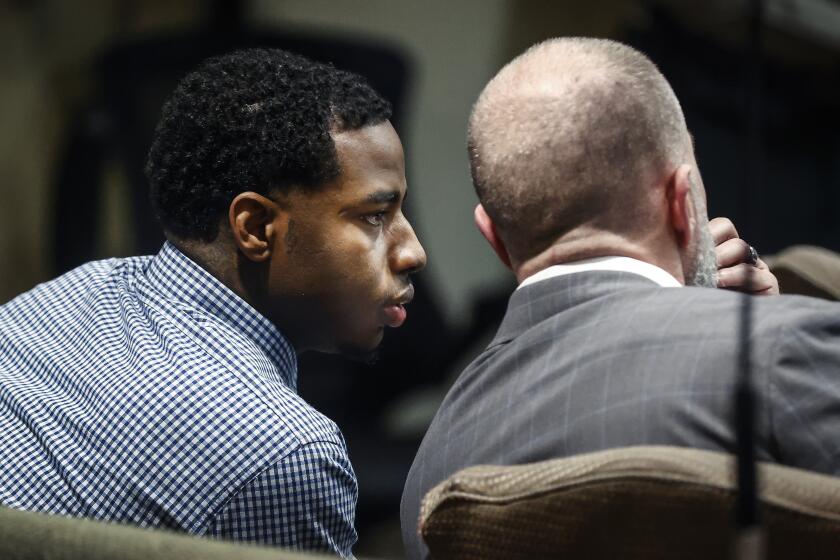‘Sacred’ Director Lindsay-Hogg Enjoying His Life in Motion
Michael Lindsay-Hogg is a man on the move. Physically, he’s fully acclimated to the rootlessness of a free-lance directing career. Psychically, he finds that constant travel and its attendant preoccupations help keep anxieties at bay.
Professionally, too, the spots keep changing. On Thursday, his staging of Canadian playwright George F. Walker’s “Nothing Sacred” opens at the Taper; Tuesday, he’s directing an NBC special, “Live at the Hard Rock,” a benefit concert for the homeless, shot on a Universal back lot and featuring Paul Simon, John Cougar Mellencamp, Ziggy Marley and Dan Aykroyd & the Blues Band.
“I’m sure there are people who think I only do music, people who think I only do theater, and people who think I only do dramatic stuff,” said the soft-spoken New York-born director. Yet at 48 he exhibits little interest in accommodating his choices to feed a high-profile, single-medium career: “I do things that interest me.”
Of “Nothing Sacred” (set in 1860s Russia and based on Ivan Turgenev’s “Fathers and Sons”), he says: “What I like about it is that it’s a political play--but with characters who get sandbagged by love; they all get hit in the head with their hearts. There are love complications with every character: sexual love, emotional love, love between friends, familial love.
“But the argument is about what life should be. The central character, Bazarov, played by Tom Hulce, is trying to figure out how (social) change is accomplished, and he pushes the buttons of the other characters to make them see the world his way. One of the things I find very little of in America--and certainly not on Broadway--are plays with political attitudes.”
Somehow, Lindsay-Hogg has always managed to find them, however.
His Broadway credits include such thought provokers as “The Normal Heart,” “Whose Life Is It Anyway?” and “Agnes of God”; on television, he directed Farrah Fawcett as a Nazi-hunter in “The Beate Klarsfeld Story” and Matthew Broderick in Athol Fugard’s “Master Harold . . . and the Boys.”
As the son of actress Geraldine Fitzgerald, Lindsay-Hogg discovered show business early, and with it a compensation for a painful school life (“Those weren’t years I’d like to live again--unless I was an adult, at my size and weight, so I could get them all”).
Acting also replaced old dreams of a baseball career (“I was very heavy as a child, and only got two hits in four years, so there wasn’t much chance of that”).
“Actors were the first people to accept me,” he said. “But in time, I also realized that they’re (often) well-read, intelligent; what they go through to get a job would kill all but the most resilient temperaments. I’ve always felt happy in their company, even though, when I was an actor, I was a bad actor.”
He said there was no pressure to join the family business.
“But I don’t know what else I would’ve done. I’m not good at normal things. I can’t drive a car. I couldn’t read till I was 10. I’ve never earned money except in this (entertainment) world.”
An actor since he was 16, Lindsay-Hogg traveled to England for a year’s study at Oxford University, then found work as a floor manager in a theater in Ireland, and as an assistant to Orson Welles on an English stage production.
At 21, he was directing the television rock show “Ready, Steady, Go” and balancing such diverse projects as TV stagings of Tom Stoppard’s plays with videos for the Rolling Stones.
The sojourn in England came to an unhappy end when he was forced to abandon his directing post on the miniseries “Brideshead Revisited” (ultimately, he and Charles Sturridge received co-directing credit) after a strike delayed production of the piece, and another film company held him to a pay-or-play contract--meaning that he couldn’t work for anyone else, whether he was filming for them or not.
“I was very frustrated,” he said. Despite longstanding connections in the music world (this year he directed “Mick Jagger at the Tokyo Dome” for Japanese television; earlier he directed the taping of Paul Simon’s “Graceland: The African Concert” in 1987), his post-”Brideshead” return to America was an eye-opener.
“In England, I was offered everything first-choice,” he said. “Here, you’re like 28th in line. Then 23rd, 18th, 16th.”
Surely, self-confidence helps?
“Every time you start a project, no matter what you’ve done or how much experience you’ve had, you always feel oddly virginal,” he said. “So you say to yourself, ‘I am smart,’ or ‘These particular colleagues will come up with something smart.’ I try not to panic too much.”
A foray into screenwriting has also been a boost: “I figure if I write it myself, I have a better chance of understanding it when I direct it.”
Is it a happy life?
“Yeah, sometimes,” he said, a bit taken aback at the question. “It’s interesting .”
The biggest entertainment stories
Get our big stories about Hollywood, film, television, music, arts, culture and more right in your inbox as soon as they publish.
You may occasionally receive promotional content from the Los Angeles Times.







